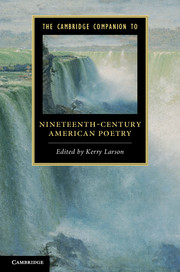Book contents
- Frontmatter
- Introduction
- I MANDATES, MOVEMENTS, AND MANIFESTOES
- II INDIVIDUAL AUTHORS
- 8 Longfellow’s ambivalence
- 9 Sarah Piatt’s grammar of convention and the conditions of authorship
- 10 Poe and Southern poetry
- 11 The color line: James Monroe Whitfield and Albery Allson Whitman
- 12 Colonial violence and poetic transcendence in Whitman’s “Song of Myself”
- 13 Emily Dickinson’s “turbaned seas”
- Selected guide to further reading
- Index
- Cambridge Companions to…
8 - Longfellow’s ambivalence
from II - INDIVIDUAL AUTHORS
Published online by Cambridge University Press: 28 November 2011
- Frontmatter
- Introduction
- I MANDATES, MOVEMENTS, AND MANIFESTOES
- II INDIVIDUAL AUTHORS
- 8 Longfellow’s ambivalence
- 9 Sarah Piatt’s grammar of convention and the conditions of authorship
- 10 Poe and Southern poetry
- 11 The color line: James Monroe Whitfield and Albery Allson Whitman
- 12 Colonial violence and poetic transcendence in Whitman’s “Song of Myself”
- 13 Emily Dickinson’s “turbaned seas”
- Selected guide to further reading
- Index
- Cambridge Companions to…
Summary
In 1837 Henry Wadsworth Longfellow was a professor of modern languages at Harvard, a hardworking teacher still growing into his new job. Three years later, after Voices of the Night (1839) and Ballads and Other Poems (1841), he was famous: after Evangeline (1847) and The Song of Hiawatha (1855), he would become and remain for decades (to quote his preeminent modern critic, Christoph Irmscher) “America's, if not the world's, most widely recognized poet,” admired by Queen Victoria and by her servants, and in his own country “so famous … that he was asked [to name] a new state in the Union.” Schoolchildren all over the USA, for almost a century, memorized his poems in schools that bore his name.
Longfellow's broad and lasting popularity has become the most salient fact about him. “Not whole poems but memorable snatches” of his poetry, Dana Gioia wrote in 1994, survive even now in “American oral culture”: “I shot an arrow into the air,” “like ships that pass in the night,” “Into each life a little rain must fall.” Americans wanted to hear what Longfellow wanted to say, and to buy what he wanted to sell: “a gentry-class poet in a democratic land,” as Matthew Gartner put it, he showed how educated Cambridge and aristocratic Boston could speak to – could even unify – the American multitudes.
- Type
- Chapter
- Information
- The Cambridge Companion to Nineteenth-Century American Poetry , pp. 155 - 171Publisher: Cambridge University PressPrint publication year: 2011
- 2
- Cited by

